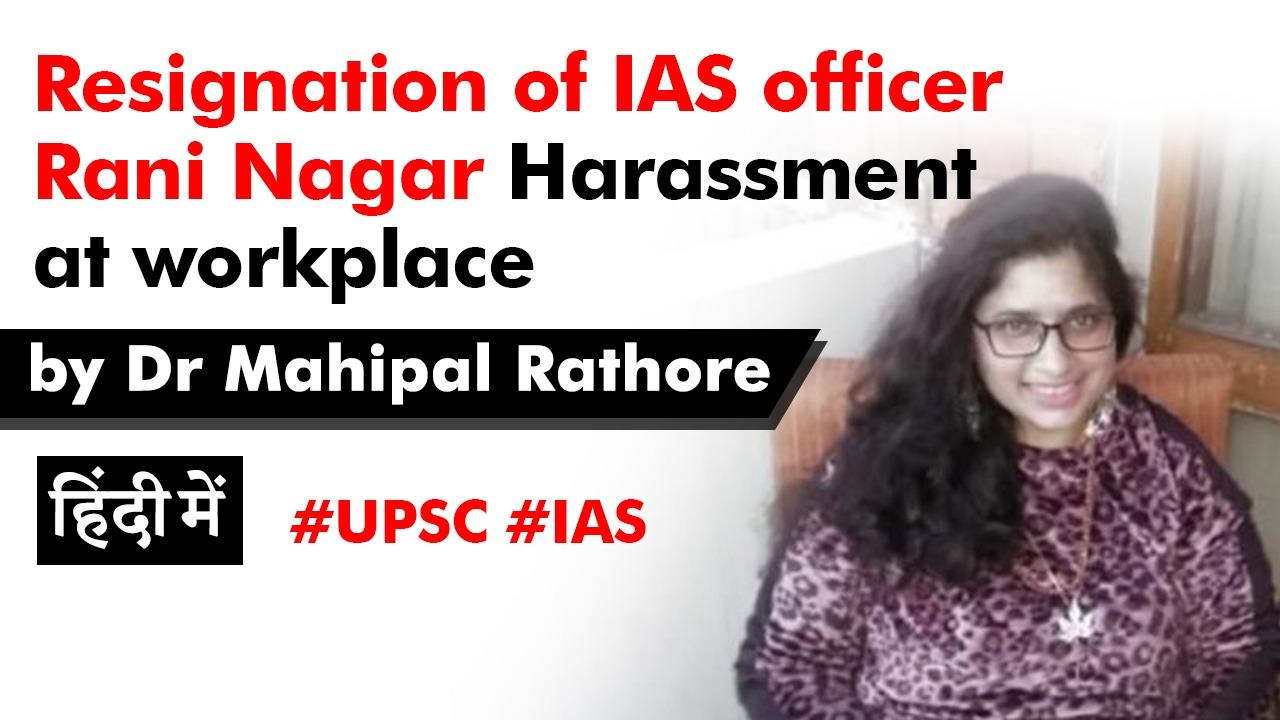Table of Contents
IAS officer resigns
- 2014-batch Haryana Cadre IAS officer Rani Nagar resigned from service citing “personal safety on government duty”.
- Nagar, former Additional Director, Social Justice and Empowerment, and Additional Director, Archives, had sent her resignation to the chief secretary on May 4 with a request to forward it to the competent authority in the Central Government for acceptance.


- She had filed a case against some police officers few months ago stating threat to her life and personal safety .
- On April 17, she uploaded a recorded video on her Facebook account, stating that if something happened to her and her sister, this video should be shown to the district court Chandigarh, where a complaint filed by her is pending.




Charges of sexual Harassment on senior officer
- In June 2018 Nagar had levelled harassment charges against a senior IAS officer, who was posted as additional chief secretary.
- She also filed a complaint before the Haryana State Commission for Women alleging that her senior officer used to talk in “double meaning words” with her and even threatened her to spoil her annual confidential report (ACR).
- An enquiry was initiated which gave a clean chit to the senior officer.


Sexual Harassment at workplace
- The last couple of years have seen a tidal wave of sexual allegations and accusations against men in professionally powerful positions across the globe
- Even the elite civil service of India (IAS) is not immune from harassment of women officers at work
What is the law to prevent this ?
- Sexual Harassment of Women at Workplace
- (Prevention, Prohibition and Redressal) Act, 2013
- Origin from Vishaka guidelines –
- Supreme Court in a judgment in 1997 laid the Vishaka guidelines, which were legally binding.
Definition of sexual harassment
- It includes “any one or more” of the following “unwelcome acts or behaviour” committed directly or by implication:
- Physical contact and advances,
- Sexually coloured remarks,
- Showing pornography,
- A demand or request for sexual favours,
- Any other unwelcome physical, verbal or non-verbal conduct of sexual nature
- This Act lays down the procedures for a complaint and inquiry and the action to be taken.
- It mandates that every employer constitute an Internal Complaints Committee (ICC)at each office or branch with 10 or more employees.
- A woman can be of any age, whether employed or not, who “alleges to have been subjected to any act of sexual harassment”, that means the rights of all the women working or visiting any workplace, in any capacity, are protected under the Act.
- Internal Complaints Committee have Powers similar to Civil Court in respect of the following matters:
- Summoning and examining any person on oath.
- Requiring the discovery and production of documents.
- When the inquiry is completed, ICC is to provide a report of the findings to the employer within 10 days.
- If the allegations are proved, ICC recommends that the employer take action for sexual harassment in accordance with the provisions of the service rules. These vary from company to company.
- It also recommends that the company deduct from the salary of the person found guilty,
- Compensation is based on: Suffering and emotional distress caused to the woman, Loss in career opportunity, Her medical expenses, Income and financial status of the respondent, Feasibility of such payment.
- After the recommendations, the aggrieved woman can appeal in Court within 90 days.
Need for stricter provisions
- The 2013 Act has entrusted the powers of a civil court to the Internal Complaints Committee (ICC) without specifying if the members need to have a legal background.
- This was a major lacuna given that the ICC formed an important grievance redressal mechanism under the framework of the act.
- The 2013 act only imposed a fine of ₹50,000 on employers for non-compliance with respect to the constitution of the ICC.
- This proved to be insufficient in ensuring that the employers constituted the ICC in a time-bound manner.
Impact of Sexual Harassment at Workplace
- It violates a woman’s fundamental right to equality (Article 14), right against discrimination (Article15) and right to life (Article 21) guaranteed by the Constitution of India
- Sexual harassment at workplace creates an insecure and hostile working environment for women which impedes their capacity to perform at work.
- It also adversely affects the social and economic growth of women and hinders women empowerment.
- A study led by the ILO found that lewd behaviour and threatening at workplaces were the most well-known reason women left the workforce in Uttar Pradesh.
- Sexual harassment also puts them through physical and emotional suffering.
- Further, harassment victims often experience secondary victimization when attempting to deal with the issue through legal or institutional means.
Latest Burning Issues | Free PDF






















 WhatsApp
WhatsApp